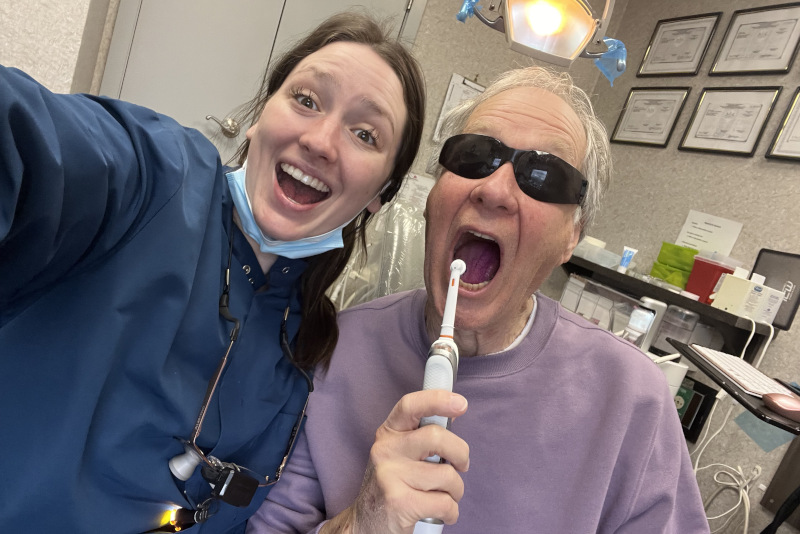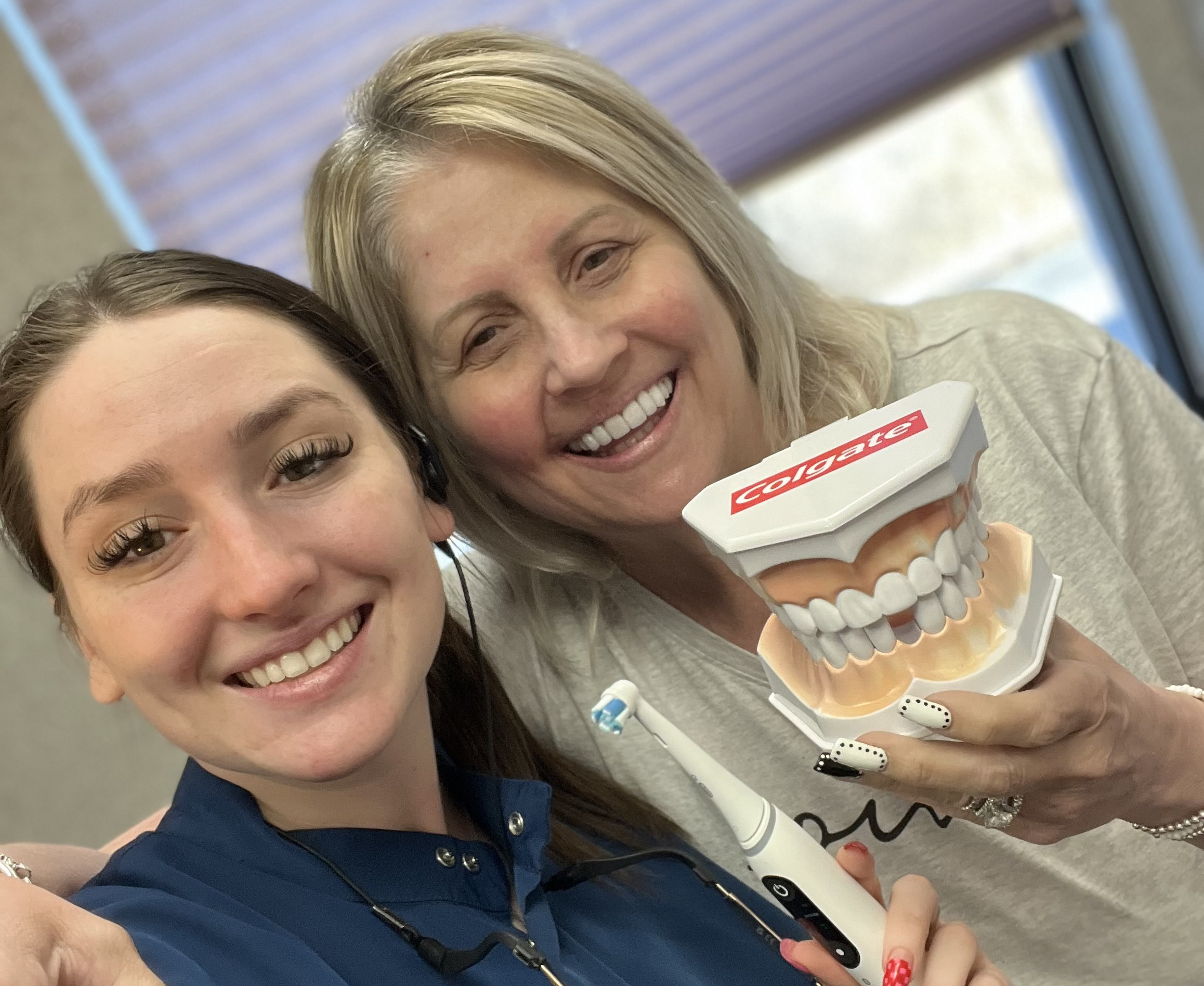
Women’s Articles

Estrogen is not a Factor in Jaw Disorders
CHICAGO-Women on birth control pills and older women taking estrogen replacements are not at increased risk of developing temporomandibular disorders (TMDs), a condition affecting the jaw muscles and jaw joint, according to a new study.
From the initial consultation
to post-procedure care,
we are here to support you
every step of the way.

TMDs are about two-to-five-times greater in women than in men, a statistic that has long puzzled dental clinicians and researchers. Symptoms can include pain in the face or jaw-joint area; limited mouth opening; jaws that “lock” or “go out”; clicking or popping sounds of the jaw joint; and other complaints, including headaches, earaches and dizziness.
Our team is ready to help you achieve the smile you’ve always dreamed of.
Results of the study are published in the March issue of The Journal of the American Dental Association.
Since women are much more likely to suffer TMDs, the study looked at whether sex hormones play some role in the condition.
Researchers from the University of Texas Health Science Center in San Antonio, studied 510 women, ages 37-82 and divided them into an estrogen-user group and a control group.
Signs and symptoms of jaw disorders were identified during clinical examination using the Craniomandibular Index (CMI), which quantifies pain and dysfunction. Results indicate the muscle and joint symptoms were not significantly different between the control group and those women taking estrogen.



A woman’s hormonal balance changes during her lifetime, which affects her dental health. As she bears children, her pregnant condition also has an impact on her dental health. We understand the chemical interplay and can help diagnose and treat gum disease in women. Call us to schedule a consultation today.
Lead researcher John P. Hatch, Ph.D., speculates that experts may have mistakenly believed a clinical link existed between estrogen use and TMDs when in fact it may have been a coincidence attributable to patient demographics. In other words, the women who aggressively seek treatment for TMDs are the same type of informed health consumers who request the pill or estrogen replacement therapy.
“Our results clearly demonstrate that demographic, socioeconomic, cultural and health care variables distinguish women who are taking estrogens from those who are not,” Dr. Hatch points out.
For those suffering from TMD, treatments vary based on individual diagnosis. According to the American Dental Association, dentists may recommend a treatment involving a step-by-step plan to determine if only minor corrective treatment is needed.
We are committed to delivering
Excellence in Dental Care



Trust our expert team to
help you achieve a smile
that reflects your true self
Excellence and Expertise


With dental implants, you can restore your smile, regain your confidence, and enjoy all the benefits of having strong, healthy teeth.
If pain and other symptoms persist, dentists may advise the following:
- Apply moist heat or take prescription medication such as muscle relaxants, analgesics or anti-inflammatory drugs to try to eliminate muscle spasm and pain.
- Wear bite plates to reduce harmful effects of clenching or grinding the teeth.
- Use relaxation techniques to help control muscle tension in the jaw. To help eliminate stress, tooth grinding or clenching, dentists may also suggest counseling.
- Lastly, when other treatments prove unsuccessful, jaw joint surgery may be recommended.
This research was supported in part by the National Institute of Dental and Craniofacial Research.
Note: Although the study referenced above appears in The Journal of the American Dental Association (JADA), it does not necessarily reflect the policies or opinions of the American Dental Association (ADA).
Women’s Dental Health Issues
Periodontal Disease and Pregnancy
Pregnant women are particularly prone to periodontal (gum) disease due to hormonal changes associated with pregnancy. Research has found that women with periodontal disease may be at higher risk for delivering pre-term, low birth weight (PLBW) infants. What effects can periodontal disease have on my pregnancy?
If you are pregnant, the hormonal changes you are undergoing will make you particularly prone to periodontal disease. And, according to research findings, if you have periodontal disease and you are pregnant, you may be at higher risk of delivering a pre-term low-birth-weight infant, that is, an infant born before the 37th week of pregnancy.
For several years, the link between infection particularly genitourinary tract infection and the delivery of pre-term low-birth-weight infants has been the subject of research. Based on the findings of this research, it appears that genitourinary tract infection causes a rapid increase in the levels of biological fluids that normally induce labor. This rapid increase leads to premature delivery. Researchers suspect that periodontal disease, which is also a bacterial infection, could trigger a similar increase in these fluid levels, thereby inducing premature labor. Scientists have documented an association between infection, especially genitourinary tract infection, and adverse outcomes of pregnancy in both animal and human studies. A recent study of periodontal infection in pregnant and postpartum women found that the likelihood of delivering a pre-term low-birth-weight infant was greater in women with periodontal disease than in those without periodontal disease. These intriguing results have prompted medical professionals to urge that additional investigations be done in this area. No known risk factor such as tobacco use, genetics, drug and alcohol use, level of prenatal care, nutrition and urinary tract infection is identified for 25% of deliveries of pre-term low-birth-weight infants. It is important to know how much periodontal disease contributes to the unexplained risk of delivery of pre-term low-birth-weight infants. Several studies are underway to assess this link. Dr. Zablotsky can provide you with updated findings in all these areas as they may affect you. He wants you to be aware of the general health risks linked to your periodontal disease.
What should I do?
Obviously, if you are pregnant, it is important that you provide us with this information at your next appointment. Following a careful assessment of your status, we will discuss how best to control any problems you are experiencing.
Never again suffer from the use of dentures, or the pain and embarrassment of missing teeth. Ever!

Women and Periodontal Disease: What you should know
What is gum disease?
Bacteria and toxins in dental plaque, a sticky colorless film that constantly forms on the teeth, causes gum disease, also known as periodontal disease. Gum disease affects the gums as well as the supporting structures of the teeth. Gingivitis, the earliest stage of gum disease, usually causes the gums to be tender, swell, turn red and bleed easily. The bleeding and swelling sometimes are visible only to your dentist. You put yourself at risk for gum disease if you are not diligent in your home regimen of oral care brushing and flossing plus regular visits to your dentist. Your gums can become sensitive, sometimes reacting strongly to the hormonal fluctuations that occur throughout your lifetime. And these same fluctuations may make you more susceptible to gum disease or make existing gum disease worse. If left untreated, gum disease can progress to a more serious stage that damages or destroys the bone and tissue surrounding the teeth. With continued neglect to seek treatment, your teeth will eventually loosen and may be lost.
Why do women have unique oral health needs?
Women have special dental needs at different stages of life. Women are especially susceptible to periodontal disease at various times of their lives. Hormonal changes such as puberty, menstruation, pregnancy and menopause can cause an exaggerated response to irritants from bacterial plaque. During these times, your body experiences hormonal changes that can make your gums sensitive and increase your risks for gum disease. The condition worsens if patients are already prone to periodontal disease. You need to take extra care of yourself at times when your body is going through these hormonal changes. Diet, exercise and regular visits to your physician are important to maintain good health. Daily brushing and flossing and regular visits to your dentist are important, too.
The Teen-Age Years
As you reach puberty, you increase your production of the female sex hormones progesterone and estrogen. As a consequence, the blood circulation to the gums is increased, possibly accompanied by increased gum sensitivity. This hormonal increase can exaggerate the way your gum tissues react to the irritants in plaque. Your gums may become red, tender, swollen and likely to bleed easily when you chew or brush your teeth. The condition can be difficult to manage when undergoing orthodontic treatment due to limitations in access for complete oral hygiene. A dental professional must remove these irritants to protect the bone and tissue surrounding the teeth from damage. Afterward, you will need to be diligent in your home regimen of oral care to prevent further swelling. As puberty progresses, your gums will have less tendency to swell. Brushing and flossing along with regular professional dental care are vital at this stage in your young womanhood.
Your Monthly Cycle
During menstruation, you may notice several changes in your mouth, including swollen gums, lesions, canker sores and swollen salivary glands because of a surge of progesterone before your period, or menses, begins. Some women don’t notice any changes at all. For others, particularly those for whom plaque or pockets are a problem, there may be bleeding gums and sores for three or four days before the start of your period/menses. During hormonal fluctuations, it is especially necessary to maintain oral health.
Pregnancy and your oral health
The old wives’ tale, “A tooth lost for every child,” seems far-fetched, but it actually has a loose basis in fact. If you are pregnant, changes in your hormone levels affect your teeth and gums just as they do other tissues in your body. Most commonly, gingivitis increases beginning in the second or third month, becomes more severe through the eighth month, then begins to diminish in the ninth month. In this condition, called “pregnancy gingivitis,” increased progesterone secretion causes gum tissue to increasingly swell, bleed and redden in response to a very small amount of plaque. If your gums are healthy before pregnancy, you are less likely to have problems. Pregnancy gingivitis usually does not affect healthy gum tissue, but just previously inflamed regions. If left untreated, pregnancy gingivitis can damage the gums and bone supporting your teeth. This damage then leads to loss of gum tissue and bone. To reduce gingival problems during pregnancy, you need to have a professional cleaning to remove irritants. You also need to be diligent in your daily, home regimen of oral care. During pregnancy, more than ever, you need to have regular dental examinations. Don’t skip a scheduled dental checkup. During your second trimester or early third trimester, more frequent professional cleanings may be beneficial. Remember, if you have tender, bleeding or swollen gums during your pregnancy, notify your dentist as soon as possible. Occasionally, a large swelling of gum tissue will form, marked with many deep-red pinpoints. This “pregnancy tumor” is an extreme inflammatory response to local irritants such as food particles, plaque or tartar. This growth may occur any time during pregnancy, but it most often appears during the third month of pregnancy. Although it is usually painless, the tumor can become painful if it interferes with your bite or if food debris collects beneath it. A pregnancy tumor is definitely not a cancer. It may be treated by professional removal of all local irritants, followed by a diligent home regimen of oral care. Be sure to discuss further treatment or removal with your dentist and your obstetrician. If you have any gum problems during your pregnancy, you must have your entire mouth examined and your periodontal health evaluated after your delivery. Dr. Katherine L. Roll can determine necessary treatment at that visit. During your pregnancy we will not only be in close communication with your physician and your general dentist but we also may recommend a more frequent professional cleanings to help you avoid problems.
If you are taking oral contraceptives
A common problem for women who take oral contraceptives, or birth control pills, is gum inflammation. The hormone in oral contraceptives increases the level of progesterone. Periodontal pathogens (disease causing bacteria) utilize this hormone as a growth factor. So good oral hygiene is especially important when taking birth control pills. Also, many medications, such as antibiotics, can lessen the effectiveness of oral contraceptives. Therefore, it is important that you inform your dentist or physician that you are taking birth control pills before either one prescribes any medication for you. Reaching menopause If you are menopausal, any oral problem that you have probably is not related to the hormonal changes you are undergoing. If you take estrogen supplements, they should have little effect, if any, on your oral health. If you have the rare condition called “menopausal gingivostomatitis”, your gums will be dry and shiny, bleed easily and appear abnormally pale to deep red. You may notice a number of physical changes when you reach menopause, including some that occur in the mouth. These may include burning sensation, altered taste sensations (salty, peppery or sour), a decrease in saliva flow that can result in dry mouth, and greater sensitivity to hot and cold foods or drinks. Also, you may find it difficult to remove any partial bridges or dentures. If any of these symptoms occur, we may be able to help you manage these conditions. Some dermatologic (skin) and ophthalmic (eye) lesions manifest themselves in the mouth as well. These lesions appear to occur at a higher incidence in menopausal and post menopausal women, and oftentimes manifest themselves in the mouth before they are present on the skin or eyes. Dr. Roll may diagnose oral problems related to menopause. We may communicate these signs and symptoms to your physician who would then recommend an appropriate treatment course.
As you make the transition through these various phases of your life cycle, always remember the importance of oral health to your overall health and well-being. Then, greet each new day and each new change with a bright, healthy smile.

CHECK OUR
Patient reviews
“Very knowledgeable and friendly staff…”


